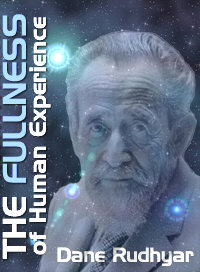 |
| Home | Bio | Art | Music | Literature | Civilization & Culture | Philosophy of Wholeness | Theosophy & Spirituality | Astrology |

CHAPTER EIGHT
Crises of Transition - 5 Potentiality and actuality When considered in the broadest philosophical frame of reference, the problem of human rights thus leads to the question of what meaning one gives to the relation between potentiality and actuality. Does what is only a potentiality of existence have the "right" to conditions making its actualization possible and (what is more important) effective? Can it be treated as if it were an actual and experienceable situation? The impregnation of a human ovum by a sperm undoubtedly produces the potentiality of the birth of a living organism able to become a person and eventually to emerge as an autonomous, self-reliant, and creative individual. But there is no guarantee that this possibility will be actualized. There can be, at best, only a statistical probability. Is such a probability sufficient for a whole community to bestow upon what is only a future event the status and "rights" of the state of personhood? The problem can be illustrated or symbolized by an example from the sociocultural field of music. A composer of serious music is inspired to produce a musical work, either by an internal, psychomental experience or by an external factor — for example, a commission to compose a symphony for a well-known orchestra. The composer's mind is thus "fecundated," and the creative process begins. It may or may not be carried to completion. Preliminary sketches must be written, then an orchestral score. But even the completed score, though paid for, may never be performed.(2) Should an unperformed score be considered music if no actual sound is heard by an actual public for which it was intended? At what stage of the creative process can the musical work be said actually to exist? Some composers claim to hear the entire music "in their head" before even beginning to write the score. Nevertheless, an orchestral score cannot be performed until a copyist extracts parts from it to be read by the instrumentalists of the orchestra. Indeed a number of possible happenings may mar the long process required actually to perform the music in the intended public situation. Thus the musical work can be evaluated only when it is related to a sociocultural group of people. It is only within such a group that a composer could possibly claim the right to hear the actualized sounds to which he or she had only given the potentiality of existence. Moreover, what is potential may not be worth actualizing, at least from the point of view of the directors and the expectable conductor of the orchestra to which the potential music (the orchestral score) has been sent. If the orchestra had an infinite amount of time and resources, all potential symphonies could be actualized (i.e. performed). But in a finite musical season — and at a cosmic level, in a finite universe — all possibilities cannot be actualized. Someone, or some factor, has to choose. According to the picture of the cycle of Wholeness I have presented, the choice is being made by the karma of the past. The ancient failures condition a dharma having the power to neutralize or balance the karma they engendered. The supreme Compassion of the Godhead at the symbolic Midnight of the cycle takes the form which, through a new set of human situations, will give the best chance of readjustment to reawakened subjective centers that once had been thrown out of the rhythm of the Movement of Wholeness by the pull of disharmonic desires and the destructive use of power. If, however, we return to the problem of the termination of pregnancy, what is involved is certainly not the actualization of a potentiality of personhood inherent in millions of similar biological occurrences, but the relation of this situation and its equally potential results to a much more inclusive interpersonal and sociocultural situation. To say that a woman has the right to dispose of what happens to her body is quite beside the point. Does not our society interfere with a person's desire to commit suicide? Does it provide the sufficient amount of biologically wholesome food to children of all families if the parents are jobless? At the biological level, the human species is far more important than any one of its members, and the character and quality of the cultural-interpersonal organization of a society is more crucial in the spread of abortion methods than the individual reaction, dismay, or fear of an unwillingly and unexpectedly pregnant woman. Sexual permissiveness is the symptom of a collective situation in which a culture has lost its capacity to make evident the need for the controls it previously imposed upon the unhindered play of biological impulses. As the rhythmic power of the cultural processes of human evolution fades out, as the options for superficially self-determined patterns of change multiply and none seems sufficiently compelling to produce an enduring commitment, the impulsion to depend again upon pre-cultural biological stimulation inevitably spreads. The often empty or tragic results of this adolescent protest, given psychological legitimacy as a personal attitude in terms of supposedly mature relationships, may lead to a panicky return to old, seemingly stable and secure traditions in the name of morality and monogamous commitment But remember the often quoted words of the first person to reach the summit of Mount Everest, when asked why he had done it: "Because it was there" — in other words, because he felt that what was only potential had to be actualized. The human situation is undoubtedly characterized by the drive to actualize what is only potential. This is human greatness but also the source of human tragedies and failures. The development of the human person, and collectively of a human culture, may reveal paths open in many directions. But during the long ages which see the rise of more and more complex cultures and personalities, the most significant and valuable thrust of the Movement of Wholeness is the drive toward greater inclusiveness and concentration. It should be in actual practice a drive away from the multiplicity of surface-experiences and eventually to the attainment of a state of centrality in which all circumferential possibilities are unified in equilibrium and peace, in simplicity and harmony. The road to that all-inclusive peace of center requires the control of many options, the refusal of many possibilities. Thus culture sets limits to biology. Personhood rises out of life, but is born of sacrifice — in the sense that it can give a "sacred" meaning to life-impulses by making them symbols of a superpersonal, planetary, cosmic, or divine reality revealing their essential function in the cyclic process of Wholeness. It can also, alas, give an anti-sacred character to these biopsychic urges by enslaving them to an imagination always eager to discover new possibilities and to make them actualities out of tune with the tide of cyclic being. 2. l personally had such an experience in the 1920s. A work of mine received a substantial prize but was considered "too modern" to be performed. Even recently, similar last-minute decisions by a conductor have occurred due to insufficient rehearsal time, resulting in only a partial performance of one of my works. Return By permission of Leyla Rudhyar Hill Copyright © 1986 by Leyla Rudhyar Hill All Rights Reserved.  Web design and all data, text and graphics appearing on this site are protected by US and International Copyright and are not to be reproduced, distributed, circulated, offered for sale, or given away, in any form, by any means, electronic or conventional. See Notices for full copyright statement and conditions of use. Web design copyright © 2000-2004 by Michael R. Meyer. All Rights Reserved. |
 |
